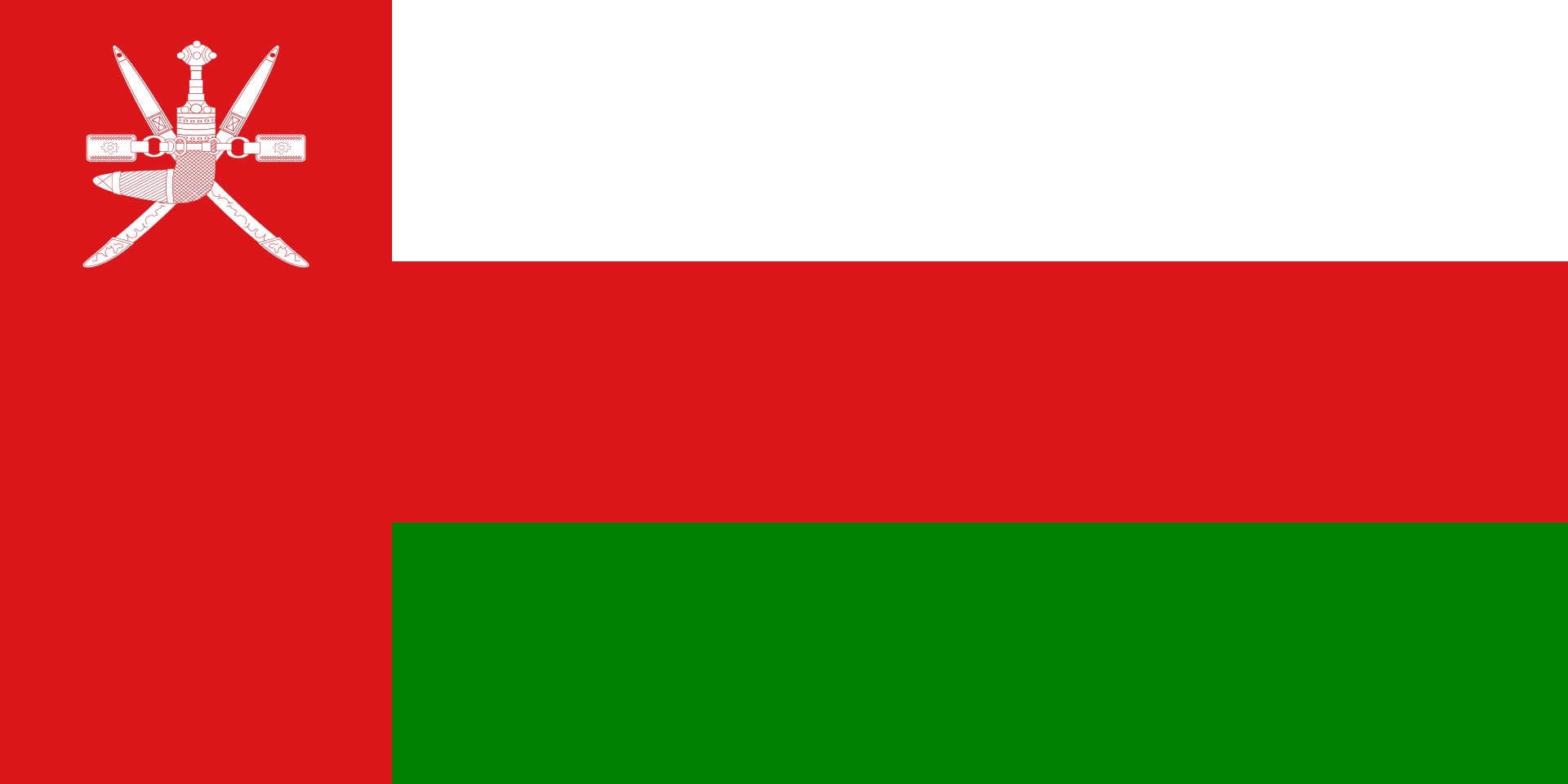

Oman
Oman's full name is the "Sultanate of Oman". It is located at the southeastern end of the Arabian Peninsula, bordering the United Arab Emirates, Saudi Arabia, and Yemen. It is adjacent to the Gulf of Oman and the Arabian Sea. It has a coastline of 3,165 kilometers and has significant location advantages. Oman's political situation is stable, its society is orderly, its legal system is sound, and its economy is relatively developed. The people's living standards are relatively good, their cultural quality is high, and their per capita GDP ranks among the highest among Arab countries. Oman is rich in oil and natural gas resources. As of the end of 2022, crude oil and condensate reserves were 4.905 billion barrels, and natural gas reserves were 24 trillion cubic feet. Mineral resources discovered in Oman include copper, gold, silver, chromium, iron, manganese, magnesium, coal, limestone, marble, gypsum, phosphate, quartz stone, kaolin, etc., but precise exploration and in-depth development have not been carried out. Oman is a typical resource-exporting country. The crude oil and natural gas industries are the backbone of the national economy, accounting for nearly 30% of the GDP, and export revenue accounts for nearly 70% of the government's fiscal revenue. Since 2014, Oman has made every effort to promote its economic diversification strategy, vigorously optimize the investment environment, actively build five major non-oil and gas industries including manufacturing, logistics, tourism, mining, and fishery, and strive to change the single economic structure that is overly dependent on the oil and gas industry.
In 2022, with the sharp rise in international oil prices and the stabilization of the epidemic, Oman's economic situation will become better than before. Calculated at constant prices, the full-year GDP was US$93.772 billion, a year-on-year increase of 4.3%, and the inflation rate was 2.8%. On the one hand, the Omani government has introduced a number of social security measures, focusing on promoting employment, stabilizing prices, and protecting housing. On the other hand, the continuously improving financial situation supports the Omani government to continue to promote economic diversification, and the development of traditional and emerging industries goes hand in hand. Oman develops a diversified economy, attracts foreign investment, and injects new impetus into the economy by vigorously developing oil and gas resources, new energy (especially hydrogen energy), mineral resources, fishery resources, and tourism resources. The World Bank predicts that Oman's GDP growth will reach 4.3% in 2023, the highest growth rate among GCC member states.
The official language of Oman is Arabic and commonly spoken English. Islam is the state religion, and most Omani Muslims belong to the IBADISM sect.
(1) Trade management regulations: Oman implements a free trade system. Any natural person or legal person may import goods for trade purposes with permission; individuals may import goods for personal use without approval; import permits must be applied for from the Trade Department of the Ministry of Commerce, Industry and Investment. [Temporary import] Temporary import is allowed in the following cases for a period of 6 months and can be extended: a. Machinery and heavy equipment required for the implementation of engineering projects or scientific practices related to projects; b. Goods imported for processing; c. Goods temporarily imported for stadiums, theaters, exhibitions; d. Machinery, equipment, and instruments imported for maintenance; e. Containers and packaged goods for filling purposes; f. Animals imported for grazing; g. Samples for display.
(2) Customs management regulations: The documents to be submitted for customs declaration include: commercial invoice, certificate of origin, and packing list. The import of agricultural products, food, publications, films and audio-visual products, medicines, weapons and defense equipment, etc. requires special permission from relevant departments. Goods entering Oman must provide a certificate of origin, and the import of products originating from Israel is prohibited. Oman complies with and implements the "Unified Customs Law of the GCC Member States"2. According to the law, all imported goods in Oman are currently subject to a tariff of 5% of the CIF value of the goods, except for the following goods. [Duty-free goods] Livestock; fresh, frozen, frozen meat and offal of edible livestock (except pork); all kinds of fresh milk, sterilized milk, and milk powder except flavored milk; ghee; seeds; seedlings; fresh vegetables; sugar; fresh fruits except bananas and dates; tea; rice, wheat, flour, barley, corn; all kinds of cooking oils and fats (except artificial ghee and lard); cement; products refined from petroleum; agricultural pesticides; all kinds of printed books, newspapers, magazines, journals, maps, engineering drawings; agricultural machinery and tools; legal tender; gold bars and coins; feed; government imported items; products produced in the Gulf Cooperation Council countries are exempt from import tariffs according to the certificate of origin issued by the relevant agency. [Goods subject to protective tariffs] Dried limes (100%); dates (20%); fresh bananas (25%); certain types of meat and meat products (pork 100%); all types of alcoholic beverages (100%); tobacco and its products (100%). 【Restricted or prohibited import items】Weapons and ammunition; imitation weapons and pistols that can be converted into weapons; tools; sticks and guns and any guns that attempt to disguise their true purpose through design modification; fireworks, firecrackers, toy weapons and pistols for children; alcoholic beverages; beer; various drugs, anesthetics and various items and tools prohibited by international drug control conferences; leaves, flowers, seeds and rhizomes of cannabis; raw opium and cooked opium; leaves, flowers, seeds and rhizomes of coca; radio receiving equipment; pornographic publications, pictures, books, cards, tapes, pens, pencils, toys and imitations printed with pornographic pictures; various blank checks and receipts; various banknotes and coins (Note: Omani customs stipulates that inbound and outbound passengers carrying more than 6,000 riyals (about 16,000 US dollars) of various currencies or securities must declare to customs); various textiles printed with banknotes, bills or securities issued by the Omani government or other governments; any other items prohibited by the laws or resolutions of relevant agencies.
(3) Preferential policies for foreign investment: [Investment projects in underdeveloped regions] The new "Regulations on the Implementation of the Foreign Investment Law" encourages foreign investment in certain specific regions or economic sectors. For example, in addition to enjoying 100% shareholding treatment, investment projects in Oman's least developed regions also enjoy other preferential policies: a. Exemption from land or house rent within 5 years from the date of project operation; b. Exemption from the current Omani ratio requirements for employment within 2 years from the date of operation; c. Exemption from all or part of the fees. In addition, the "Regulations" stipulate that investment projects in the IT and logistics sectors can also enjoy tariff reductions and exemptions.
【Tax incentives】The Regulations for the Implementation of the Foreign Investment Law stipulate that, without prejudice to any GCC reciprocal arrangements related to tariffs, the following foreign investments are exempt from "taxes, tariffs and non-tariffs" projects: integrated tourism projects, projects related to information technology and telecommunications, industrial projects with a cost of more than 10 million riyals, projects related to the transport sector and seaports (logistics), strategic investment projects mentioned above, projects employing not less than 200 Omani workers or projects with an Omanization percentage exceeding the minimum Omanization requirement of 25%, projects providing modern technology and technology for the production or provision of services, industrial projects using raw materials in Oman, and other projects designated by the Ministry of Commerce, Industry and Investment after the approval of the Council of Ministers. In terms of tariff exemptions, the imported items must be necessary for the foreign investment project and must be imported in the name of or for the benefit of the foreign investment project.
【Land incentives】The Omani Foreign Investment Law allows the relevant authorities to allocate land or real estate to foreign investment projects in the form of long-term leases or usufructs. The lease or usufruct can be granted for 50 years and can be extended with the approval of the relevant authorities. The relevant authorities depend on the nature of the foreign investment project. For example, in the case of building a desalination plant, the relevant authority is the Public Service Regulatory Authority.
(4) Special Economic Zone Regulations: Duqm Special Economic Zone 1 was officially established in October 2011 and is the first and only special economic zone in Oman. The development vision of Duqm Special Economic Zone is to build it into a logistics center on the Arabian Sea, an attractive modern commercial port, a safe investment destination and a famous tourist destination, thereby comprehensively promoting the diversification of the country's economy. To achieve the above goals, the Omani government positioned Duqm Special Economic Zone as a large special economic zone and introduced a Singaporean team to be responsible for planning and investment promotion. Here, foreign investors can establish 100% wholly-owned companies; the proportion of Omani employees can be reduced to 10%; goods imported into the special zone and goods exported from the special zone are tax-free; investors can enjoy "one-stop" services for registration, obtaining business licenses and environmental licenses; electricity prices, water prices, and land lease price concessions can be negotiated with the special zone management committee. In addition, various policies and measures to encourage investors in the special zone, such as company registration, trade facilitation, land leasing and tax concessions, are also being further improved and will be implemented in succession.

Customized overseas services for Chinese enterprises
Helping Chinese companies to expand overseas with less worries
